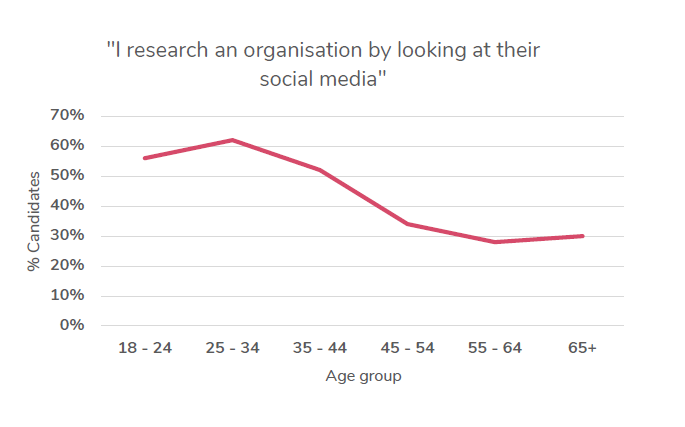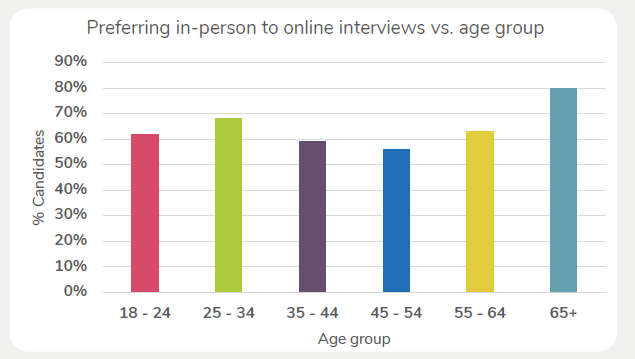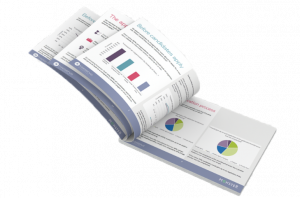New research: Older candidates & the recruitment process
In our recent research into candidate behaviour, we asked jobseekers across the UK how they felt and acted during the hiring process.
Today, we’re focusing on the experiences of older candidates. (In the context of our research, this means respondents who ticked the 55+ age brackets.)
From pre-application research to sentiments around online interviews, what did we discover?

Ageism in recruitment
Let’s start with some uncomfortable context. Earlier this year, the ONS released data which showed that people aged 50+ are significantly more at risk of long-term unemployment.[1] This has been exacerbated in the wake of the pandemic.
Meanwhile, new research this month revealed that workers aged 45+ are viewed as weaker job candidates than their younger counterparts.[2] Conversely, the same report also found that Hiring Managers believe 87% of employees aged 45+ perform at the same standard as, or better than, younger colleagues.
Candidates who fall into the ‘older’ age brackets are clearly delivering value once they are in the workplace – but many are struggling to get a foot in the door. The key barriers seem to be outdated perceptions of age, or inaccessible hiring processes.
It’s time to hear from the candidates themselves. What actions do they take, and how do they feel during a typical recruitment journey?
“Give people a chance. Teach people some new skills.” – Survey respondent
Pre-application: Research, social media and contacting an employer
We asked respondents to imagine they were interested in a new role. Where would they look for information first?
Unsurprisingly, the most popular channel was an organisation’s own website, with 80% of 55 + respondents agreeing that they would check out a company website to research a role.
However, this number fell sharply when we asked the same candidates whether they would also look at the careers section of an organisation’s website. Only 59% of older candidates would do so, compared to almost 80% of younger respondents.
Takeaway: Don’t hide compelling inform about your company culture, benefits or social value on your careers pages. Make sure it’s accessible for all potential candidates to find on the main part of your website.
Perhaps unsurprisingly, under a third of candidates aged 55+ would research an organisation via social media (see chart below).
This next stat, however, did surprise us: In our research, only 12% of our older respondents would contact an organisation to find out more about a role. In contrast, 55% of candidates aged 18 – 24 would do so.
With more career experience, we expected older candidates to be more likely to contact an employer directly to find out more about a role – especially when compared to younger candidates. So why are so few reaching out?
It could be down to the ease of finding contact information. Often job descriptions do not clearly provide an email address for candidates to contact if they have questions (the most popular method of communication for our older respondents). In some cases, candidates are encouraged to ask chatbots.
Take away: Where practical, provide a couple of ways for which candidates to get in touch. For example, a phone number and an email address. Be clear on email response times, or when a phone line would be manned. This will manage your candidates’ expectations, and help your team manage enquiries.
Remember too that older candidates may be aware of ageist attitudes (whether intentional or not), which way dissuade them from contacting a potential employer.
Take away: If you are keen to increase the number of older applicants, consider investing in sources more commonly used by older jobseekers, such as certain job boards or publications. And review the wording of your job descriptions and contact details, to ensure they are accessible and encouraging.
“Ageism is not dead even if it is illegal. We can bring so much to a role… We have been there, done that.” – Survey respondent
The application process: Complexity is losing you talent
Digital accessibility and experience may also hamper older candidates when it comes to your application forms.
A higher proportion of 55+ years respondents would give up on an application if it was too complicated (58% compared to the average 53% across all age groups).
Technology, like an Applicant Tracking System, can help to streamline and simplify your hiring process. We’ve got lots of tips on page 11 of Candidate Behaviour: The Big Report, to help make your recruitment journey quicker and easier for applicants.
Here’s a bonus take away: Ask your team to routinely test your recruitment process, and get into the mindset of different candidate personas. Ask for their honest feedback, and get them to time their applications. Looking for more? Access your full research report – packed with stats and ideas – right here!
With automated communications, an ATS can also ensure your candidates don’t fall into the black hole of ‘no feedback’.
“Currently applying for roles to which I know I am more than suitable. Frustratingly, not even getting a courtesy call to say that application will not be taken forward and most important not being told why application is not being taken forward.” – Survey respondent
The interview process: Do older candidates miss face-to-face interviews?
Our research found that all respondents preferred in-person interviews, with an average of 62% agreeing across all age-groups.
However, if we purely focus on the 65+ age group, that number rockets up to 80% favouring in-person.

We’re interested to see how these figures change next year, as we all adapt to (hopefully) a post-pandemic world. With greater numbers of us experiencing remote interviews, will the percentage of jobseekers preferring in-person conversations have fallen? And will this be reflected equally across all age groups?
Interestingly, older candidates were consistent with other age groups in terms of their comfort-levels with online and telephone interview formats.
This suggests that older candidates have adapted as quickly as the rest of us in terms of interview methods.
Take away: The key is managing expectations and making information accessible. Older candidates are likely to have fewer pathways and routes to digital information (as a lower percentage are on social media or use other resources such as employee review sites), so providing information in a clear and easily located way is essential.
So, what have we learnt?
- Older candidates (55+) use fewer digital platforms to research organisations and jobs. An organisation’s website is the most popular port of call, so make sure you have compelling information about your roles and working ethos in order to attract and engage candidates of all demographics – and make it easily accessible!
- Applicants in the older age-brackets are significantly less likely to contact an employer directly about a role. Make sure to include accessible contact details for candidates who wish to find out more.
- Almost 60% of older candidates would give up on an application process if it was too complex. Test your applications regularly to understand where you can make improvements. If you don’t have one already (or it’s not up to scratch), considering implementing an ATS to help streamline your processes.
- 55+ years candidates are most likely to miss face-to-face interviews. However, the majority still feel comfortable with phone and online interview methods.
 In our new research, Candidate Behaviour: The Big Report, we spoke to a diverse range of candidates. Created in partnership with Monster, we asked jobseekers across the country, of all ages and working in a wide range of sectors, to tell us how they act, think and feel during the hiring process.
In our new research, Candidate Behaviour: The Big Report, we spoke to a diverse range of candidates. Created in partnership with Monster, we asked jobseekers across the country, of all ages and working in a wide range of sectors, to tell us how they act, think and feel during the hiring process.
So if you’re particularly interested in insights on Gen Z candidates, or interested in how male and female candidates differ, download your report today!
[1] https://www.theguardian.com/society/2021/jan/18/over-50s-who-lose-jobs-much-more-likely-to-stay-unemployed-study-finds
[2] https://www.hrdive.com/news/ageism-job-search-global/603474/



